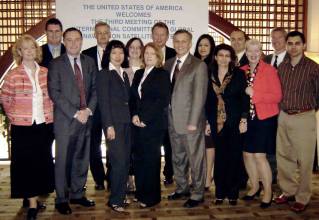
UPDATED OCTOBER 19 2008: Organizers of the third meeting of the International Committee on GNSS (ICG) scheduled for December 8–12 in Pasadena, California, are actively seeking the participation of industry and interested members of the GNSS community.
UPDATED OCTOBER 19 2008: Organizers of the third meeting of the International Committee on GNSS (ICG) scheduled for December 8–12 in Pasadena, California, are actively seeking the participation of industry and interested members of the GNSS community.
For the first time, commercial providers of GNSS equipment and services
are being invited to exhibit and sponsor events at the ICG meeting,
which will take place at the Westin Pasadena hotel.
Hosted by the United States government, the gathering of representatives of the world’s GNSS system operators, augmentation and regional system providers, and organizations of important user communities follows an inaugural 2006 meeting in Vienna, Austria, and last September’s conference in Bangalore, India.
The Russian Federation will host the next ICG meeting in St. Petersburg September 14-18 2009. China has offered to host the fifth meeting.
With the encouragement of the United Nations Office for Outer Space Affairs (UN OOSA), ICG was established as an informal body to promote cooperation on matters of mutual interest related to civilian satellite-based positioning, navigation, and timing, as well as the compatibility and interoperability of GNSS systems. UN OOSA’s office in Vienna, Austria, serves as the ICG secretariat.
Within the ICG is the Providers Forum, consisting of those countries operating GNSS systems or with plans to develop one: the United States (GPS, WAAS), European Community/European Space Agency (Galileo, EGNOS), the Russian Federation (GLONASS), and China (Compass/Beidou). ICG members with regional augmentation systems are India (GAGAN, IRNSS), Japan (MSAS, QZSS), and Nigeria (NIGCOMSAT).
An ICG Experts Meeting took place July 15 in Montreal, Canada, with a variety of updates on system developments that will probably reappear in Pasadena presentations. A Chinese representative provided further details on Compass (Beidou II) signals (See related story, “China Offers More Insight into Compass Signals.”)
Mark Schmulevich, of the Russian Space Agency’s Institute of Space Device Engineering, described the GLONASS System of Differential Correction and Monitoring (SDCM) under development. SDCM, the first phase of which underwent operational testing last year, will broadcast real-time GLONASS and GPS differential corrections and integrity alerts, with a goal of 1–1.5 meters horizontal accuracy and 2-3 meters vertical accuracy Eventually, SDCM, which has a similar design as other satellite-based augmentation systems (WAAS, EGNOS, MSAS, GAGAN) will include 19 reference stations, a central processing facility, and a GEO satellite.
Four ICG working groups (WGs) deal with compatibility and interoperability (WGA), enhancement of performance of GNSS services (WGB), information dissemination (WGC), and interactions with national, regional authorities, and international organizations (WGD).
Ten ICG associate members represent key GNSS user communities, such as International Society for Photogrammetry and Remote Sensing and the International Earth Rotation and Reference Systems Service. The Pasadena agenda includes a session in which associate members and observers will present recent developments in their organizations and associations with regard to GNSS services and applications.
A session on GNSS scientific and technology applications will introduce issues and opportunities in user applications and GNSS technology for consideration by the ICG or its working groups. Among the topics currently proposed are earthquake-related and satellite-based applications. Industry presentations are also being invited, including one by Google representatives on coordinates and mapping issues.
At an opening plenary session, GNSS providers will present the status and future plans for their systems. All presenters will identify issues for discussion in the ICG and/or its working groups.
Later in the week, the Providers Forum and working groups will meet separately, associate members and observers will provide updates on recent developments in their organizations and associations with regard to GNSS services and applications.
Draft recommendations may be exchanged among the working groups, providers, and full ICG, with a final plenary considering proposals as recommended by the Providers Forum.
Companies interested in exhibiting and/or sponsoring an event at ICG-3 may contact the following individuals for further information: Alice Wong, Office of Space & Advanced Technology, Department of State, telephone 202-663-2388, mobile 202-439-0384, fax 202-663-2402, e-mail <wongaa2@state.gov>; or Sindy Cruz, Senior Sales Manager, The Westin Pasadena, telephone 626-304-1442, fax 626-795-7669, e-mail <Sindy.Cruz@Westin.com>.
More information about the ICG-3 can be found on-line at <http://www.geolinks.org/>
<http://www.geolinks.org/>.
The fourth meeting of the ICG will be held September 14–18, 2009, in St. Petersburg, Russia — a change of venue from Sochi, Russia, as previously reported.



